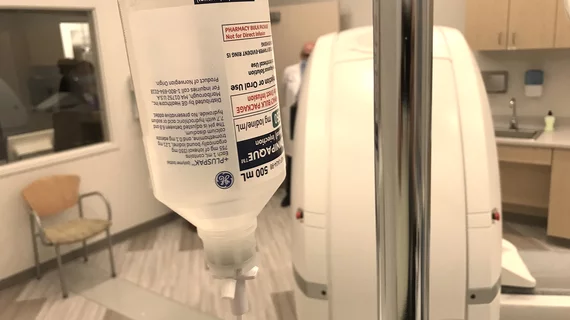Investigation into patient's death after contrast injection begins
An investigation into the death of a patient who suffered a catastrophic allergic reaction to iodinated contrast began this week in England.
David Horsman passed away in March of 2022 after undergoing a contrast-enhanced CT scan at Royal Bolton Hospital. Horsman, an internationally recognized electrical engineer, was having the scan done as part of a routine follow-up after beating bowel cancer.
The scan was conducted right outside the hospital in a van owned by InHealth, a private healthcare company that describes itself as “the UK’s largest specialist provider of diagnostic and healthcare solutions” on its website.
Horsman had no known history of allergic reactions to iodinated contrast. However, after his scan, his skin started to flush and he began to feel very hot and cough, according to the radiographer, Indogesit Okon, who conducted his scan.
Recognizing that Horsman was having an allergic reaction, Okon called the hospital’s radiology department. After no one picked up, Okon called the hospital’s crash team and told them there was an “emergency at the CT van, the patient reacted to contrast.”
However, due to a miscommunication, potentially owed to language barriers (Okon had arrived weeks earlier from Nigeria), the crash team went to hospital’s children’s ward, rather than the mobile scanner. This resulted in a significant delay in emergency care—a total of 17 minutes elapsed between when the phone call was made and when the crash team arrived.
During that time, Okon, who admits he was feeling overwhelmed by the situation, repeatedly called the hospital’s emergency department. A nurse from the department came to assist Okon and began chest compressions when Horsman stopped breathing. He was still doing compressions when the crash team arrived to stabilize Horsman, who was immediately admitted to the hospital.
Although the mobile scanner did contain a defibrillator, Okon had not yet been trained on how to use it since arriving on assignment from Nigeria. Another radiographer and the nurse who came to assist told the court that they were able to find the defibrillator on the van but were struggling to get it to work.
Horsman did not survive his injuries. The coroner pinned his death on an anaphylactic reaction to iodinated contrast, with heart disease being a contributing factor.
During a hearing held at Bolton Coroners' Court on Wednesday, Horsman’s wife shared how shocked she was when she got the call about her husband’s reaction. She told the court that he had undergone similar scans multiple times and had never experienced any sort of adverse reaction.

